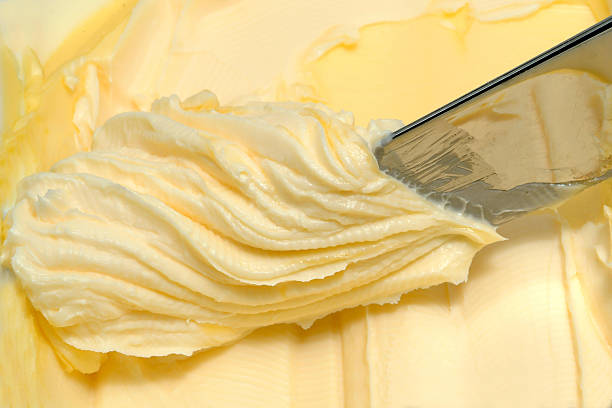Margarine has been a favored alternative to butter for many, igniting debates and criticisms regarding its nutritional value and components. As plant-based diets gain traction, it’s essential to scrutinize whether margarine aligns with vegan principles, leading to a dive into its composition and history.
Table Of Contents
−- Margarine Demystified: What Is It Exactly?
- The Inception of Margarine
- Composition: What Constitutes Margarine?
- Margarine’s Production Process
- Vegan Considerations: Can Vegans Consume Margarine?
- Non-Vegan Ingredients in Margarine: What to Watch Out For
- Vegan Butter vs. Margarine: Are They the Same?
- How to Determine Vegan Suitability: Reading Labels
- Margarine Brands with Vegan Options
- Is Margarine a Healthy Choice?
Margarine Demystified: What Is It Exactly?
Many seemingly straightforward questions warrant deeper exploration. “What is margarine?” falls into this category. The Oxford Dictionary succinctly defines margarine as a substitute for butter, produced from vegetable oils or animal fats. However, this definition barely scratches the surface, as contemporary margarine incorporates a broader array of ingredients.

The Inception of Margarine
French scientist Hippolyte Mège-Mouriès concocted margarine in 1869, responding to Napoleon III’s call for a cost-effective butter substitute. Initially formulated with beef fat, technological advancements soon facilitated the use of hydrogenated vegetable oils, shifting its base components. The unappealing natural white hue of margarine is often dyed yellow to resemble butter, enhancing its market appeal.
Composition: What Constitutes Margarine?
Margarine is primarily an amalgam of water and fats, with the fats predominantly sourced from plants. Various oils, including soybean, palm, canola, olive, and corn oil, serve as the fat base. Additional ingredients like salt, artificial and natural flavors, and coloring agents are incorporated, occasionally raising vegan concerns due to potentially non-plant-based additives.
Margarine’s Production Process
Producing margarine is a meticulous seven-step procedure. It begins with oil extraction through cold pressing or solvent use, followed by refining to eliminate impurities. Hydrogenation may be employed to solidify the oils, inadvertently creating trans fats, which have been linked to numerous health issues. The refined oils are then blended, mixed with water or milk, and enhanced with additional ingredients. After pasteurization to eradicate pathogens, the mixture undergoes solidification, resulting in the familiar margarine product.
Vegan Considerations: Can Vegans Consume Margarine?
Although most margarine products are inherently vegan, exceptions exist. Some formulations incorporate animal-derived components like milk, lactose, whey, or casein, rendering them unsuitable for a vegan diet. Thus, meticulous label reading is imperative for vegans to avoid non-compliant ingredients.
Non-Vegan Ingredients in Margarine: What to Watch Out For
Margarine’s seemingly simple recipe, consisting of water, plant-based oils, and salt, can sometimes be misleading. Non-vegan ingredients frequently appear on labels, including whey, lactose, buttermilk, casein, suet, vitamin D3, fish oil, lecithin, tallow, and palm oil (due to their controversial production practices). Vigilance in ingredient examination is crucial for maintaining a vegan lifestyle.
Vegan Butter vs. Margarine: Are They the Same?
Although “vegan butter” is essentially a rebranded margarine, distinctions in marketing and consumer perceptions exist. With veganism’s rising popularity and margarine’s past trans fat concerns, the term “vegan butter” presents a more palatable, trendier alternative. However, the ingredient lists between the two products are virtually identical, necessitating close scrutiny by consumers.
How to Determine Vegan Suitability: Reading Labels
The easiest approach to ascertain the vegan status of margarine is through careful label examination. Avoid products containing whey, casein, lactose, animal fats, vitamin D3 derived from lanolin, fish oils, lecithin from animal tissues or eggs, suet, or tallow. Many brands also explicitly indicate their vegan credentials on the packaging, aiding consumers in making informed choices.
Margarine Brands with Vegan Options
For those seeking reliable vegan margarine brands, options include Earth Balance, Blue Bonnet Light Margarine, and Smart Balance Light, among others. It’s advisable to always cross-verify with the ingredient list to ensure compliance with vegan dietary standards.
Is Margarine a Healthy Choice?
While the initial inquiry revolves around margarine’s vegan status, the overarching question pertains to its health implications. Comprising 80% fat, some margarine variants contain harmful trans fats and are produced with deleterious chemicals, raising health concerns. Nevertheless, when consumed in moderation, many individuals find vegan margarine and its alternatives to be acceptable additions to their diet.

Editorial Staff
Our writers, editors, content managers, and SEO specialist. We all take part in crafting amazing articles. We spend hours ensuring that each article is based on facts, researched, and thorough. You'll never want to click the back button to look for more answers other than here!
